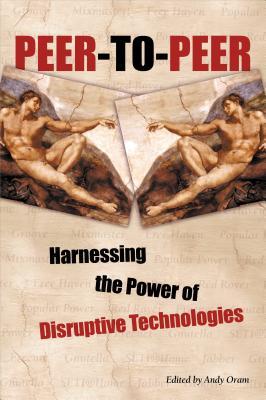What do you think?
Rate this book


450 pages, ebook
First published January 1, 2001
This is a collection of articles by technologists and thinkers in the "Peer to Peer" movement. This book was published at the height of the peer-to-peer buzz and introduces many of the projects and technologies that comprise (or comprised) peer-to-peer. There are articles about specific projects like SETI@home, Jabber, Gnutella, Freenet, Groove, and many others. There are also articles about concepts that are import in peer-to-peer like metadata, privacy, trust, performance, and reputation.
The articles are primarily technical, making this book feel something like a conference proceedings. Also, much of the book's emphasis is on wide-scale, anonymous publishing and file-sharing, with little treatment of small-group collaboration. Also, in the passage of time since this book was published, several of the represented projects and companies have become defunct. Nevertheless, this is a very good introduction to peer-to-peer.